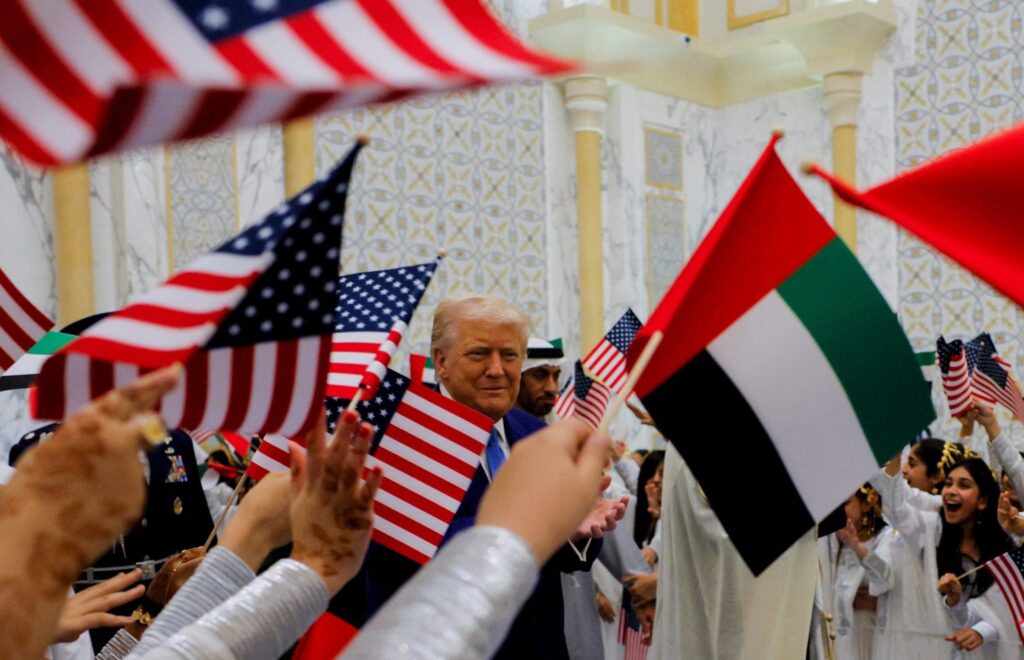As the dust settles on Donald Trump’s visit to the Gulf, the UAE should be grinning about its AI partnership with the United States.
Signing deals is one thing; laying down the foundations for a long-term partnership is another, especially in the dog-eat-dog world of artificial intelligence.
Among the flurry of deals announced during Trump’s four-day trip, the US-UAE AI acceleration partnership stands out for several reasons.
The centrepiece of this new alliance is the construction of a 5-gigawatt AI campus in Abu Dhabi, which hogged the headlines partly because of its sheer size. The 10-square-mile facility – to be built by G42 and operated in partnership with American tech companies – will be the largest AI facility outside the US.
The move positions the UAE as “an important strategic partner in the region”, according to Howard Lutnick, the US secretary of commerce, who called the agreement “a historic Middle Eastern partnership”.
For many observers, it represents a strategic inflection point in US-UAE relations, highlighting growing mutual trust and alignment in areas such as AI, cloud computing and cybersecurity. This newly cemented trust will also pave the way for the UAE to import 500,000 of Nvidia’s most advanced AI chips, starting as early as this year.
The partnership could prove to be a real boost to the UAE’s aspirations to become a global AI powerhouse. Importing high-performance chips represents a substantial increase in the Emirates’ computational capacity and abilities.
The influx of Nvidia hardware will allow for sophisticated AI models to be used across multiple sectors, from healthcare to finance, transport to energy and education to space.
This agreement signals America’s endorsement of the UAE’s ambitions in AI. That’s one mighty backer.
Still, the UAE hasn’t exactly been waiting around for Trump’s approval. It has been quietly charting its own AI course, taking deliberate steps to position itself as a hub – through national strategies, large-scale investments, international partnerships and the creation of dedicated institutions.
In 2017, the country launched the National Strategy for Artificial Intelligence 2031, a long-term plan that prioritises AI integration across critical sectors and aims to cultivate local talent and supportive regulation.
Two years later, Abu Dhabi launched Mohamed bin Zayed University of Artificial Intelligence (MBZUAI) – the world’s first postgraduate institution dedicated solely to AI. Since then, momentum has only grown. Earlier this month, the UAE became the first country to mandate AI education across all school grades.
Is there a catch?
There’s no denying the transformative impact this deal will have on the UAE’s tech ecosystem – especially with the world’s leading AI superpower now in its corner. But as with any meaningful partnership, success hinges on mutual benefit.
The long-term agreement positions Washington as a major player in shaping how AI is deployed across the Gulf – offering a strategic counterweight to growing Chinese and Russian tech influence in the region.
It sends a clear message: the US intends to drive innovation alongside trusted allies, while reinforcing its technological and geopolitical edge against rival powers.
Lutnick, in a candid quote, said the agreement with the UAE was “a major milestone in achieving President Trump’s vision for US AI dominance”.
There were concerns in Washington about forming a partnership with a new ally in such a sensitive area, but strict controls and ongoing oversight are likely to be part of the agreement to safeguard US national security interests. American companies will operate the data centres in the UAE and offer American-managed cloud services throughout the region.
That brings us to soft power. With US technology companies involved in the partnership, they will want to include training, R&D and talent exchanges. While these will help to build AI skills within the UAE, they will also promote American standards, ethics and governance frameworks.
Many will feel the pros massively outweigh the cons – and the agreement aligns with the UAE’s hyper-focus on becoming a global AI hub.
It’s a mutually reinforcing pact: America gains leverage and alignment; the UAE gains credibility, capability and a technological edge. Both sides win together and over the long term.
Justin Harper is an award-winning business journalist and editor with more than 20 years of experience in London, Singapore and Dubai



